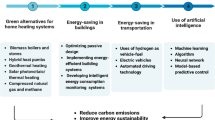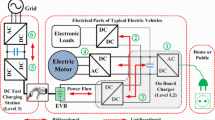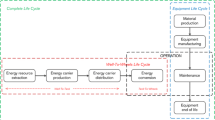Abstract
Among the general problematic of the HEV power trains, the most critical point is the determination of the power-split ratio between the mechanical and the electrical paths, known as the energy management strategy (EMS). Many EMS are proposed in the literature, and can be grouped in two categories: the local optimization EMS and the global optimization EMS. The local optimization category corresponds to the EMS based on human expertise and the knowledge of the power train components efficiency maps. Thus, the local optimization EMS manages the power train operations by referring to predefined rules. The drawback of such strategies is that it brings an instantaneous fuel consumption optimization, and does not fully optimize the fuel consumption over the whole trip. Therefore, additional fuel savings are still possible. This paper presents an overall optimized predictive EMS for the Toyota Hybrid System (THS-II) power train of the Prius. The proposed EMS is based on Dynamic Programming (DP), where the prior knowledge of the route is required in order to predetermine the power-split ratio and optimize the fuel consumption for the whole predicted route. The DP EMS proposed for the THS-II power train is designed with a very short computation time, intended to be implemented in real-time applications. The potential of this DP-controller in reducing fuel consumption on regulatory cycles are computed and compared to a rule-based controller and to the Prius published fuel consumption results. Finally, the fuel reduction enhancements of the DP-controller are computed for real road tests achieved on a MY06 Prius in Ile-de-France, by comparing to the associated observed consumption measurements.
Similar content being viewed by others
Abbreviations
- C :
-
torque Nm
- E :
-
energyJ
- F :
-
forceN
- J :
-
inertiakg.m2
- k b :
-
basic velocity ratio of PGT —
- K D :
-
differential gear ratio —
- M :
-
mass kg
- P :
-
powerkW
- R W :
-
wheel Radiusm
- t :
-
times
- V :
-
velocitykm/h
- η :
-
efficiency-
- ω :
-
speed RPM
- Δ:
-
variation-
- DP:
-
Dynamic Programming
- ECU:
-
Electronic Control Unit
- EMS:
-
Energy Management Strategy
- eCVT:
-
Electric Continuous Variable Transmission
- e-Drive:
-
Electric Drive
- e-line:
-
Engine Economic Line
- FC:
-
Fuel Consumption
- HEV:
-
Hybrid Electric Vehicle
- ICE:
-
Internal Combustion Engine
- MEP:
-
Electronic Power Module
- MG:
-
Motor Generator
- MY:
-
Model Year
- PGT:
-
Planetary Gear Train
- RB:
-
Rule-Based
- SF:
-
Seperation Factor
- SOC:
-
State of Charge
- THS:
-
Toyota Hybrid System
References
Baalen, J. (2006). Optimal Energy Management Strategy for the Honda Civic IMA. M.S. Thesis. Technische Universiteit Eindhoven.
Bellman, R. and Dreyfus, S. (1962). Applied Dynamic Programming. Princeton University Press.
Gonder, J. (2008). Route-Based Control of Hybrid Electric Vehicles. National Renewable Energy Laboratory.
Guzzella, L. and Sciarretta, A. (2007). Vehicle Propulsion Systems: Introduction to Modeling and Optimization. 2nd Edn. Springer. Appendix III. 310.
Lin, C., Filipi, Z., Wang, Y., Louca, L., Peng, H., Assanis, D. and Stein, J. (2001). Integrated, feed-forward hybrid electric vehicle simulation in SIMULINK and its use for power management studies. SAE Paper No. 2001-01-1334.
Lin, C., Peng, H. and Grizzle, J. (2004). A stochastic control strategy for hybrid electric vehicles. Proc. American Control Conf., Boston, MI.
Lin, C., Peng, H., Grizzle, J. and Kang, J. (2003). Power management strategy for a parallel hybrid electric truck. IEEE Trans. Control System Technologies 11,6, 839–849.
Lin, C., Peng, H., Grizzle, J., Liu, J. and Busdiecker, M. (2003). Control system development for an advancedtechnology medium-duty hybrid electric truck. SAE Paper No. 03TB-45.
Liu, J. and Peng, H. (2006). Control optimization for a power-split hybrid vehicle. Proc. 2006 American Control Conf., Minneapolis, Minnesota, USA.
Mansour, C. (2009). Simulation and Validation of Models of Hybrid Vehicles: Case study of the Toyota Prius. Chapter 3. Ph. D. Dissertation. MINES ParisTech. Paris. France.
Mansour, C. and Clodic, D. (2010). Modeling of the THSII series/parallel power train and its energy management system. Proc. World Automotive Cong. FISITA 2010, F2010-B-107.
Mansour, C. and Clodic, D. (2012). Dynamic modeling of the electro-mechanical configuration of the Toyota hybrid system series/parallel power train. Int. J. Automotive Technology 13,1, 143–166.
Meisel, J. (2006). An analytic foundation for the Toyota Prius THS-II power train with a comparison to a strong parallel hybrid-electric power train. SAE Paper No. 2006-01-0666.
Moisdon, J. (2002). Recherche Opérationnelle 3, Phénomènes Aléatoires. Ecole des Mines de Paris, 25–42.
Musardo, C., Rizzoni, G. and Staccia, B. (2005). A-ECMS: An adaptive algorithm for hybrid electric vehicles energy management. Proc. 44th IEEE Conf. Decision and Control, and the European Control Conference 2005. Seville, Spain.
Sciarretta, A., Back, M. and Guzzella, L. (2004). Optimal control of parallel hybrid electric vehicles. IEEE Trans. Control Systems Technology 12,3.
Sciarretta, A., Guzzella, L. and Onder, C. (2003). On the power split control of parallel hybrid vehicles: from global optimization towards real-time control. Automatisierungstechnik 51,5, 195–203.
Sniedovich, M. (1992). Dynamic Programming. CRC Press. New York.
Author information
Authors and Affiliations
Corresponding author
Rights and permissions
About this article
Cite this article
Mansour, C., Clodic, D. Optimized energy management control for the Toyota Hybrid System using dynamic programming on a predicted route with short computation time. Int.J Automot. Technol. 13, 309–324 (2012). https://doi.org/10.1007/s12239-012-0029-0
Received:
Revised:
Accepted:
Published:
Issue Date:
DOI: https://doi.org/10.1007/s12239-012-0029-0




